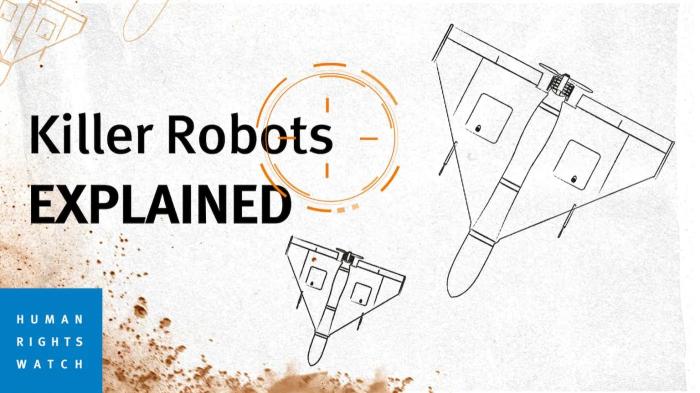(New York, August 26, 2024) – Governments should heed United Nations Secretary-General António Guterres’ call to open negotiations on a new international treaty on lethal autonomous weapons systems Human Rights Watch said today. These “killer robots” select and attack targets based on sensor processing rather than human inputs, a dangerous development for humanity.
In a report released on August 6, 2024, the secretary-general reiterated his call for states to conclude by 2026 a new international treaty “to prohibit weapons systems that function without human control or oversight and that cannot be used in compliance with international humanitarian law.” This treaty should regulate all other types of autonomous weapons systems, the secretary-general said.
“The UN secretary-general emphasizes the enormous detrimental effects removing human control over weapons systems would have on humanity,” said Mary Wareham, deputy crisis, conflict and arms director at Human Rights Watch. “The already broad international support for tackling this concern should spur governments to start negotiations without delay.”
Autonomy has been incorporated into weapons systems for years, but the duration of operation, geographical scope, and environment in which autonomous weapons systems operate have been limited. Technological advances are driving the development of weapons systems that operate without meaningful human control, delegating life-and-death decisions to machines. The machine rather than the human operator would determine where, when, or against what force is applied.
The UN report was mandated by a December 2023 UN resolution that asked the secretary-general to seek the views of countries and other stakeholders on ways to address the challenges and concerns raised by autonomous weapons systems “from humanitarian, legal, security, technological and ethical perspectives,” and reflect those views in a report. General Assembly Resolution 78/241 also added an agenda item on lethal autonomous weapons systems to the provisional agenda of the 79th session of the UN General Assembly, which opens on September 10.
The new UN report reflects 58 submissions from more than 73 countries, and another 33 submissions from the International Committee of the Red Cross and civil society groups including Human Rights Watch. A review by the Automated Decision Research project of the Stop Killer Robots campaign found that 47 of the 58 submissions expressed support for some form of prohibitions or regulations on autonomous weapons systems.
Many submissions for the UN report express concern and regret at the inability of talks at the Convention on Conventional Weapons (CCW) held since 2014 to make progress and adopt new international law on this issue. States should move their discussions to another international forum to begin negotiations. In his report, the secretary-general called the UN General Assembly “a venue for inclusive discussions” on autonomous weapons systems given its “near universal membership and wide substantive scope,” as well as its ability to consider “international peace and security” concerns.
Tackling the killer robots challenge under the auspices of the General Assembly would allow greater consideration of concerns that have been overlooked in previous discussions, Human Rights Watch said. These include ethical perspectives, international human rights law, proliferation, and impacts on global security and regional and international stability.
In the report, the secretary-general reiterates that “time is running out for the international community to take preventative action on this issue,” and reaffirms “the need to act urgently to preserve human control over the use of force.”
Interest in negotiating an international treaty on autonomous weapons systems continues to grow. In April, more than 1,000 representatives from 144 countries attended a high-level international conference in Vienna on the problems raised by autonomous weapons systems. The conference followed a series of regional meetings on autonomous weapons systems concerns held over 14 months in Costa Rica, Luxembourg, Trinidad and Tobago, Philippines, and Sierra Leone. Most issued regional communiques calling for the urgent negotiation of a legally binding instrument containing prohibitions and restrictions on autonomous weapons systems.
At the secretary-general’s initiative, world leaders will convene at UN headquarters on September 22-23 for a Summit of the Future. They are expected to endorse a “Pact for the Future” covering a wide array of initiatives, including killer robots. The current draft of the Pact recommends that countries act “with urgency” to develop an instrument to address the risks posed by autonomous weapons systems.
“The Summit of the Future provides an important opportunity for states to express high-level support for opening negotiations to ban and restrict autonomous weapons systems,” Wareham said. “Without explicit legal rules, the world faces a grim future of automated killing that will place civilians everywhere in grave danger.”
Human Rights Watch is a cofounder of Stop Killer Robots, the coalition of more than 260 nongovernmental organizations across 70 countries that is working for new international law on autonomy in weapons systems.









